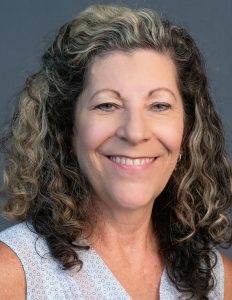Last week as I was preparing my sermon for Sunday, I was reading the passage in Mark where the blind man, Bartimaeus, asks Jesus to heal his blindness. Unlike other places in Scripture where someone asks Jesus to heal them of blindness, Jesus doesn’t ask Bartimaeus anything except what he wants. The answer is he wants to see.
He wants to see! I began to think, how often do we “want to see?” I’ve heard over and over again the last several months: “I can’t watch the news, I just can’t stand to see what’s going in the world” or “I can’t take another campaign commercial” I just have to leave the room when they come on, I just can’t wait until they’re over.
Do we want to see? Is it easier in our world today to live with our heads in the sand and choose not to see what’s going on? As followers of Christ, should we want to see? Should we need to see the things going on in our world in order to be the best people we can be?

Cheryl Kimble
There certainly was a good example of the disciples closing their eyes. Time and time again Jesus told the disciples what was to come and they just stuck their heads in the sand. Jesus told them and they either chose not to see or they just couldn’t comprehend what was to come.
I know when I watch the news each and every night there are so many things beyond my comprehension. Seeing a gunman taking down a number of students makes it very difficult for parents to send their children to school each morning. Hearing so much about drugs and fentanyl makes this Grammy want to take her grandchildren and hide them away until they’re grown.
I was at a football game last week sitting next to a young girl who is a freshman in high school. We had been hearing all about a stabbing at a local school. She was talking about how terrible it was and then she mentioned that other students in the school stood around and took photos of the stabbing to sell, and that her little brother saw one of the photos and it traumatized him.
What does seeing do to our young children?
On the news, we see bombs destroy homes, schools or hospitals and we’re supposed to pick a side and think it’s all worthwhile. Is it any wonder we want to hide our eyes and pretend nothing is going on? Why do we want to see the pain and suffering of others, especially when we feel so much pain of our own?
I have many family members who have seen war up close and personal. I understand Post Traumatic Stress Disorder. I’ve watched people I love come back from war different people. Unfortunately, that’s a part of war. Sadly, when we see horrible things, we can’t unsee them. Oftentimes they are engraved in our memories and can be life changing.
Is it possible that we, as people of the modern age, see too much? We watch the news and we see all the traumatic things happening in the world and maybe we have a little PTSD ourselves. Maybe we want to hide our heads in the sand because we can’t unsee those terrible acts of violence happening in our world.
“Bartimaeus wants to see but when he begins to see, he sees with the eyes of Christ.”
I sit here today in the midst of one of the most divisive elections of my lifetime. I have my opinions and sometimes I get a little upset when I see things in print I don’t believe or when I see the candidates I support say things that cause even more division.
When the election happens and we finally see the results, will the divisiveness be over? No! I think it will be worse because we don’t want to get over it. We want our person or people in office, and we are not going to be good sports about losing because we’re right, and I’m not going to try and see the other’s point of view. I’m not going to try to make the best of it. If my person or people don’t win, maybe I’ll just put my head back in the sand.
Anna Carter Florence in her book A Is for Alabaster writes about the story of Nicodemus: “No matter how wise we are, no matter how many degrees we hold, no matter how respected a member of a faith community we may be or how many years we’ve spent reading and studying Scripture, there is always more light to see, always. And it may rock our worlds. It may reset our hard drives. One day, we may find ourselves going over an idea or position we thought we’d resolved long ago. And how does a person find energy to begin a new quest, become a new creation after having grown old?!”
Bartimaeus wants to see but when he begins to see, he sees with the eyes of Christ. Being healed by Jesus, he wants nothing more than to follow him. He believes, he follows. Does he want to hide his head in the sand and not see sometimes? I’m guessing he does. I imagine he doesn’t want to see Jesus hung on a cross but as a follower, as a believer, perhaps he has to look on.
What is our role as followers of Christ when it comes to having our eyes opened? Obviously, Jesus wanted the disciples to open their eyes, so it’s important that we open our eyes to everything going on in our world. It’s important we know how to respond to a hurting world, and we can’t do that if we don’t know how people are hurting.
If we don’t know what’s going on in Ukraine, Israel or even my town of Austin, Texas, then we won’t know how to use our voices to see justice. We won’t know how to send help when needed. We won’t know how to lift our voices in prayer for those who are in need of shelter, food, health care, safety and, most importantly, love. The kind of love Jesus taught us. The kind of love we’re called to spread in this world.
If we want to be true people of Christ in the world, we need to remember to look for that light that might just rock our world and make us new creations.
Cheryl Kimble serves as senior pastor at The Church at Highland Park in Austin, Texas, where she just celebrated 24 years on staff. She and her husband, Roy Kimble, enjoy spending time with family, especially their five grandchildren.


